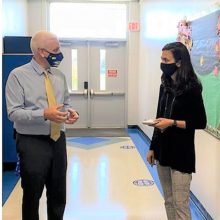Virtual event on mental health and well-being | On Thursday, Oct. 29, join the Institute for Emerging Issues for the final virtual meeting in the ReCONNECT to Move Forward series. The meeting will examine the increase in mental health challenges as a result of COVID-19 and how we address near-term needs while building support systems to thrive in a post-pandemic world. Learn more and register here.
Public education in the pandemic | On Wednesday, EdNC’s Liz Bell tuned into the 19th’s event on public education in the pandemic. Read her Twitter thread here, or her recap below.
Loni Watson, a high school counselor in Nebraska, recently came home from a hectic day of in-person school to walls filled with Sharpie doodles from her two children, and broke down crying.
“You throw a mom that’s also a teacher or works in education, an administrator, or a school counselor, into the pandemic, where we’re now the emotional labor of the education (system), we’re the cook… we’re the caretaker,” Watson said. “It is a lot for everybody.”
From Watson to U.S. Sen. Elizabeth Warren, a Democrat from Massachusetts — educators, elected officials, and advocates from across the country spoke of the challenges facing families, schools, and students through the pandemic Wednesday. The virtual summit, hosted by nonprofit newsroom The 19th, especially highlighted the added layers of stress on working mothers. You can watch the entire event here.
Warren spoke of the breakdown of America’s child care system, an already fragile industry that was often inaccessible and unaffordable for parents before the pandemic.
“I think it’s harder than ever for women to find the child care arrangements that let them either finish their education, or take on a more demanding job, go from part time to full time, whatever it is they want to do,” Warren said.
She said child care should be seen as necessary infrastructure for the country that requires investment. She said the child care industry needs substantial relief funds, as well as long-term restructuring.
Guilford County Superintendent Sharon Contreras was part of a panel on how schools are struggling to reach underserved children through the pandemic.
“It’s heartbreaking to know that you’re losing students,” Contreras said. She shared how some families lack high-speed internet access which presents barriers for learning and exacerbates learning loss for children who were already behind.
She said she is often overwhelmed by navigating the decisions on how and when to bring students back for in-person instruction, and wishes there were statewide or countrywide standards for local leaders to use.
“While I have very serious concerns, I think I have to balance that with the concerns of what the life outcomes will be for these children of color, these poor children, if they’re not in school.”
Featured Read
How career and technical education shuts out Black and Latino students from high-paying professions
Career and technical education is viewed as a gateway to good jobs. But a new Hechinger/AP analysis finds a deep racial divide in who benefits.... Read the rest
-
Can new forms of parent engagement be an education game changer post-COVID-19?
-
Restarting the “science of reading” conversation
-
Some NC Schools Have Been Open For Nearly 3 Months. How's That Going?
-
Credit and noncredit programs need to be aligned



